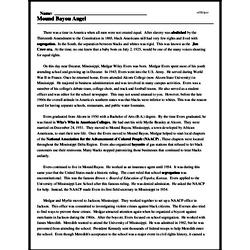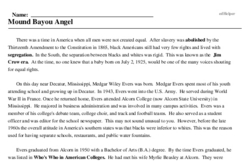Mound Bayou Angel
Mound Bayou Angel
Reading Comprehension for July 2
There was a time in America when all men were not created equal. After slavery was abolished by the Thirteenth Amendment to the Constitution in 1865, black Americans still had very few rights and lived with segregation. In the South, the separation between blacks and whites was rigid. This was known as the Jim Crow era. At the time, no one knew that a baby born on July 2, 1925, would be one of the many voices shouting for equal rights.
On this day near Decatur, Mississippi, Medgar Wiley Evers was born. Medgar Evers spent most of his youth attending school and growing up in Decatur. In 1943, Evers went into the U.S. Army. He served during World War II in France. Once he returned home, Evers attended Alcorn College (now Alcorn State University) in Mississippi. He majored in business administration and was involved in many campus activities. Evers was a member of his college's debate team, college choir, and track and football teams. He also served as a student officer and was editor for the school newspaper. This may not sound unusual to you. However, before the late 1960s the overall attitude in America's southern states was that blacks were inferior to whites. This was the reason used for having separate schools, restaurants, and public water fountains.
Evers graduated from Alcorn in 1950 with a Bachelor of Arts (B.A.) degree. By the time Evers graduated, he was listed in Who's Who in American Colleges. He had met his wife Myrlie Beasley at Alcorn. They were married on December 24, 1951. They moved to Mound Bayou, Mississippi, a town developed by African Americans, to start their new life. Once the Evers moved to Mound Bayou, Medgar helped to start local chapters of the National Association for the Advancement of Colored People (NAACP) . These chapters were located throughout the Mississippi Delta Region. Evers also organized boycotts of gas stations that refused to let black customers use their restrooms. Many blacks stopped patronizing those businesses that continued to treat blacks unfairly.




